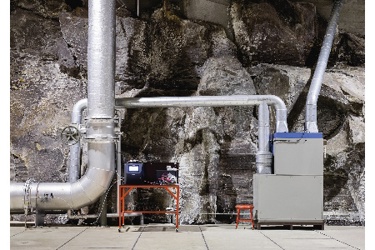Warm Reception In Iceland To Groundwater Monitoring That Provides An Immediate Response To Potential Contamination Events

Mitigating the risk of contaminated water, the largest utility company in Iceland has completed five years of capturing vital real-time measurements with innovative, automated flow cytometers.
Seeking to improve trust in water quality and public health, Veitur Utilities has introduced a total of 5 BactoSense analysers to provide real-time monitoring of water online.
Made by bNovate in Switzerland, BactoSense ensures water safety by providing an immediate response to potential contamination events. This was seen as an ideal opportunity by Veitur Utilities to help improve the management of boreholes, especially during prolonged rain events and ice melts.
Sverrir Guðmundsson, Research and Development Lead at Veitur Utilities, said:
“Before introducing BactoSense, we did not know how the most exposed boreholes behaved during floods. But after a sizeable thawing event in 2018, we implemented UV disinfection as a backup for the lower areas that are more exposed. We have also implemented direct measurement with BactoSense, which provides more information about the boreholes' behaviour.
“BactoSense measures Total Cell Count (TCC) in water. By monitoring boreholes and measuring their background values, we now know how the boreholes that we have observed behave, and how sensitive they are during events.”
‘Strong indicator of contamination’
He added: “Comparing the TCC values from BactoSense with the count of cultivated bacteria, we always find a very high correlation, but no uniform correlation. That relates to the complexity of microbiomes that vary between seasons, locations and even between events. What is certain is that a rise in TCC, especially a high rise, is a strong indicator of microbiome contamination. Now, we can utilise the lower areas more confidently, as we know that increased TCC values strongly indicate contamination, and we can stop using the borehole.”
“Also, before implementing BactoSense,” he continued, “we took manual samples for plating to control the microbial quality. We discarded lower-quality water and distributed untreated potable water. This was possible in Reykjavik because we operate two production areas with a total production capacity of 2400 litres per second, which is double as much as the highest water consumption peaks we have ever observed. Back then, our production system faced two problems: on the one hand, manual bacterial plating did not allow us to monitor the water from the lower production areas in real time. There, the older, shallower boreholes are more exposed to surface contamination. Therefore, in wintertime (between October and April), we needed to take them entirely out of operation.
“On the other hand, we faced production restrictions in the higher area. We only have permission to produce 300 litres per second annually from deeper boreholes of higher quality because they have less exposure to surface water contamination. Higher-area boreholes alone are not enough to satisfy the whole demand.”
‘Quickly assess the situation’
Sigrún Tómasdóttir, a geologist at the Research and Development Department of Reykjavik Energy (the parent company of Veitur Utilities), added:
“We use BactoSense manually for some of the smaller utilities by taking samples that we can analyse in less than 30 minutes. For example, a few months ago, we had what appeared to be a failed sample taken during regular auditing. We were sceptical about the result because the weather conditions were frosty and calm, which makes for good water quality. We could compare the results to previous samples from that utility. The TCC value did not exceed our previously observed background samples. We could immediately tell the health authorities that this may have been faulty sampling and not wait three days for the plating to replicate. We could quickly assess the situation and avoid disturbing the population.”
She continued: “BactoSense helps us to mitigate the risk of contaminated water. In addition to improved public health, there is also a social impact on the population because they can trust the water quality.
“It is a matter of national pride that we have clean water that people rely on, and we want to maintain that. We know of our advantages with water quality compared to other countries, but we have challenges. For example, we have very permeable bedrock, which means that surface contamination, if it occurs close to our well fields, can enter the groundwater and persist for a long time. Therefore, it is essential that large water production areas were defined decades ago. Our essential task at Veitur is maintaining that legacy and the protection areas. We work hard to bring public awareness on that topic because not everyone knows where water comes from and how sensitive it can be.
“We've learned that the bacterial community around the wells we're utilising can be very diverse, even within the same production area.
Sverrir Guðmundsson continued:
“We also learned that the TCC values decay slowly before stabilising after rain or melting events. This may take up to days in Reykjavik and even weeks in some of the boreholes we have been monitoring in West Iceland. Knowing how fast the boreholes recover and stabilise after an event is critical for us.
‘Better manage risk and control’
“The operator sets the water quality thresholds. Without BactoSense, the threshold is set depending on the time of the year. With BactoSense, high quality is defined by TCC background value within the 99% confidence interval. Everything in between is considered good quality. This situation has allowed us to implement a reliable flushing process before sampling for the health authorities. Now they can entirely rely on the quality of their sample collection process.
“BactoSense is accurate and reliable. It helps us better manage risk and control the water quality of the groundwater extraction boreholes. Now, we can make more optimal use of the water resource.”
For more information, visit www.bnovate.com
Source: bNovate
